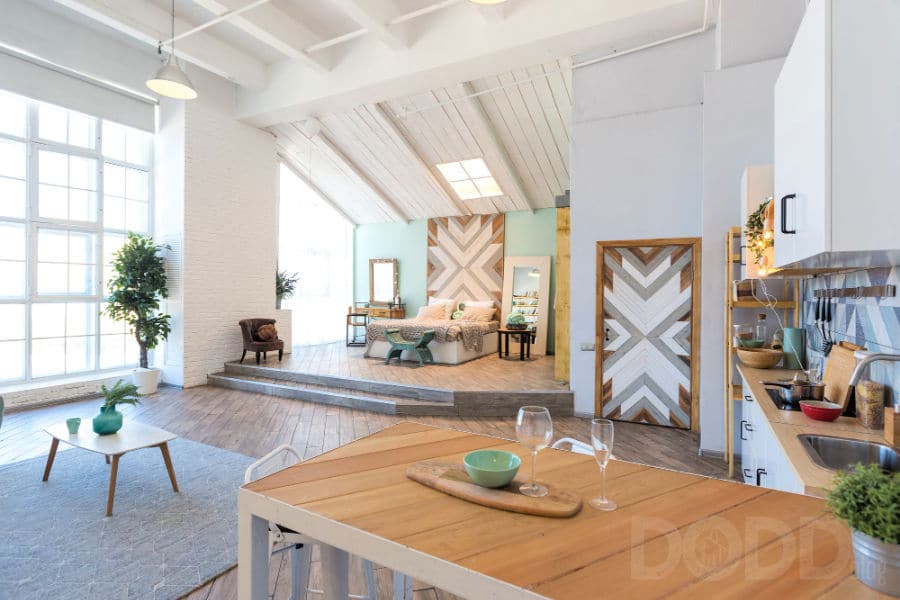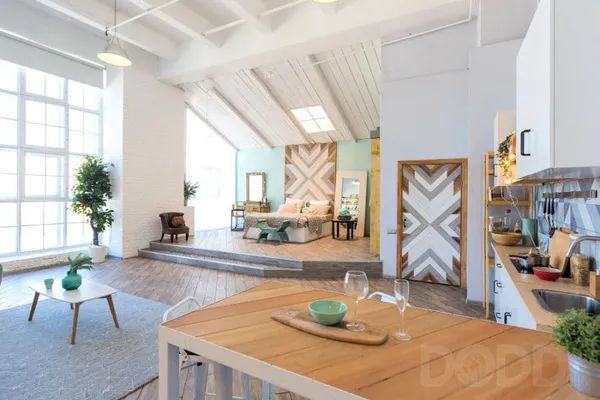Remote working has become the norm for many of us, especially in a bustling city like London, where commuting feels like a thing of the past. But, if you’re trying to work from a smaller space—a flat with limited rooms or a cosy corner in your kitchen—finding that perfect, productive setup can feel like Mission Impossible.

Fear not! With a little creative thinking and some practical solutions, you can transform even the most compact spaces into a home office that isn’t just functional but also comfortable and inspiring. Here’s how to make it work.
1. Find the Right Spot (Even If It’s Not a Traditional Office)
When space is tight, you might not have a dedicated office. That’s OK! Whether it’s your kitchen, dining table, or even a corner of your living room, the key is finding a spot you feel comfortable in and can focus.
Here are some tips for multipurpose spaces:
- The Kitchen Table: If this is your go-to, try to avoid clutter. Keep your working hours separate from your cooking hours if possible. Use a laptop stand or tray to easily transition between work and meals.
- The Living Room: If there’s a free corner, move a small desk or floating shelf there to create a pocket-sized workspace. Adding a folding screen or curtain can help separate it visually, giving it a ‘mini office’ feel.
- The Bedroom: Not ideal, but if it’s your only option, keep a clear boundary between work and rest. Use a small desk that doubles as a nightstand or bring in a lap desk for flexibility.
2. Invest in an Ergonomic Chair
If there’s only one upgrade you make to your remote setup, this should be it. It doesn’t matter if you’re working at a stylish dining table or a cramped corner desk—comfort is king. Spending hours in a standard chair can lead to back pain, neck stiffness, and all-around discomfort.
Why Choose Ergonomic Office Chairs?
- Support Matters: These chairs offer better lumbar support, which keeps your spine happy.
- Customisation Options: Adjustable armrests, seat height, and tilt functions mean you can tailor the chair to your body.
- Compact Designs Available: For small spaces, consider models designed with minimalistic frames.
Many retailers in London now offer a variety of ergonomic office chairs, from budget-friendly finds to high-end picks. And while it might seem like a splurge, it’s a long-term investment in both your health and productivity.
3. Double Duty Furniture for Space-Saving Style
When working remotely (especially in a small space), furniture that pulls double duty is an absolute lifesaver. Think compact and functional:
- Folding Desks or Wall-Mounted Tables: Great for temporary workspaces. When you’re done for the day, just fold it down and reclaim the space.
- Storage-Friendly Seating: Benches or ottomans with hidden storage can stow away work items like notebooks, chargers, and stationery.
- Carts on Wheels: Use a simple utility cart to store your work essentials. Roll it out when you’re working and tuck it away when you’re not.
Not only do these solutions save space, but they make the work-to-home switch a breeze!
4. Renovate That Unused Nook
If you’re ready to take your setup a step further, consider renovating an unused area in your home into a dedicated workspace. Even in small London flats, there’s often untapped potential waiting to be discovered.
Ideas for Home Office Renovations:
- Alcove Office: If you have an alcove in your living room or bedroom, install a custom or floating desk to create a sleek working nook. Add shelves above for storage without taking up floor space.
- Cupboard Workspace: Yes, you read that right! Convert an open cupboard or wardrobe into an office by fitting a desk inside. At the end of the day, close the doors, and voilà—your office disappears.
- Under-the-Stairs Haven: The area under your staircase can be a surprisingly cosy and productive spot if cleared out and fitted with a small desk, chair, and some lighting.
You don’t need a huge budget for these small renovations—local DIY stores in London are full of affordable shelving solutions and floating desk options. A little creativity goes a long way!
5. Declutter with Smart Storage
No matter how small your workspace is, clutter can make it feel even smaller. The trick is to stay organised with smart storage solutions:
- Vertical Storage: Use your walls! Install shelves, pegboards, or wall pockets to keep your desk clear.
- Cable Management: Nothing clogs a desk like tangled cables. Invest in cable organisers, clips, or under-desk trays to keep everything neat.
- Stackable Bins or Boxes: Perfect for filing papers or storing gadgets you only need occasionally.
Londoners are no strangers to limited space, but with a little decluttering, your workspace can look—and feel—bigger.
6. Natural Light, Plants, and Decor
Just because your workspace is small doesn’t mean it can’t be beautiful. A space that feels good makes working in it much more enjoyable. Here’s how to spruce it up:
- Bring in Natural Light: Position your desk near a window if possible. If not, invest in a good desk lamp to create a warm, inviting atmosphere.
- Add Greenery: Small potted plants or even a hanging plant can add life to your space without taking up much room.
- Personal Touches: Add minimal, calming decor like photo frames, inspirational quotes, or soft throws (but don’t overdo it—clutter kills productivity).
7. Set Boundaries and Routines
Finally, don’t forget the importance of boundaries. When your workspace is also your living space, it’s easy to blur the lines. To maintain balance:
- Stick to work hours and avoid overworking.
- Tidy up your workspace at the end of the day.
- Step away from your desk for breaks to avoid burnout.
Wrapping It Up
Setting up a remote workspace in a smaller home doesn’t have to be a challenge. With some clever furniture choices, smart renovations, and a few decor touches, you can create a place that’s practical, stylish, and comfortable.
Investing in home office chairs that combine style with comfort makes all the difference too. And if you’ve been putting off sorting your home office, take this as your cue to start today. A little effort now will lead to greater comfort, productivity, and even joy down the road.
What was your biggest small-space struggle when you started working from home? Share in the comments—I’d love to hear your solutions too!
- Keeping Your Home Office Documents Organized
- How To Make The Transition From Office Worker To Working From Home
- Your Guide to Traveling Through London With Ease
- Chairs for handicapped: Empowering dads to create inclusive home workspaces
- This Summer, Stay Cool, Calm and Collected with these Quick Tips to Control Stress








